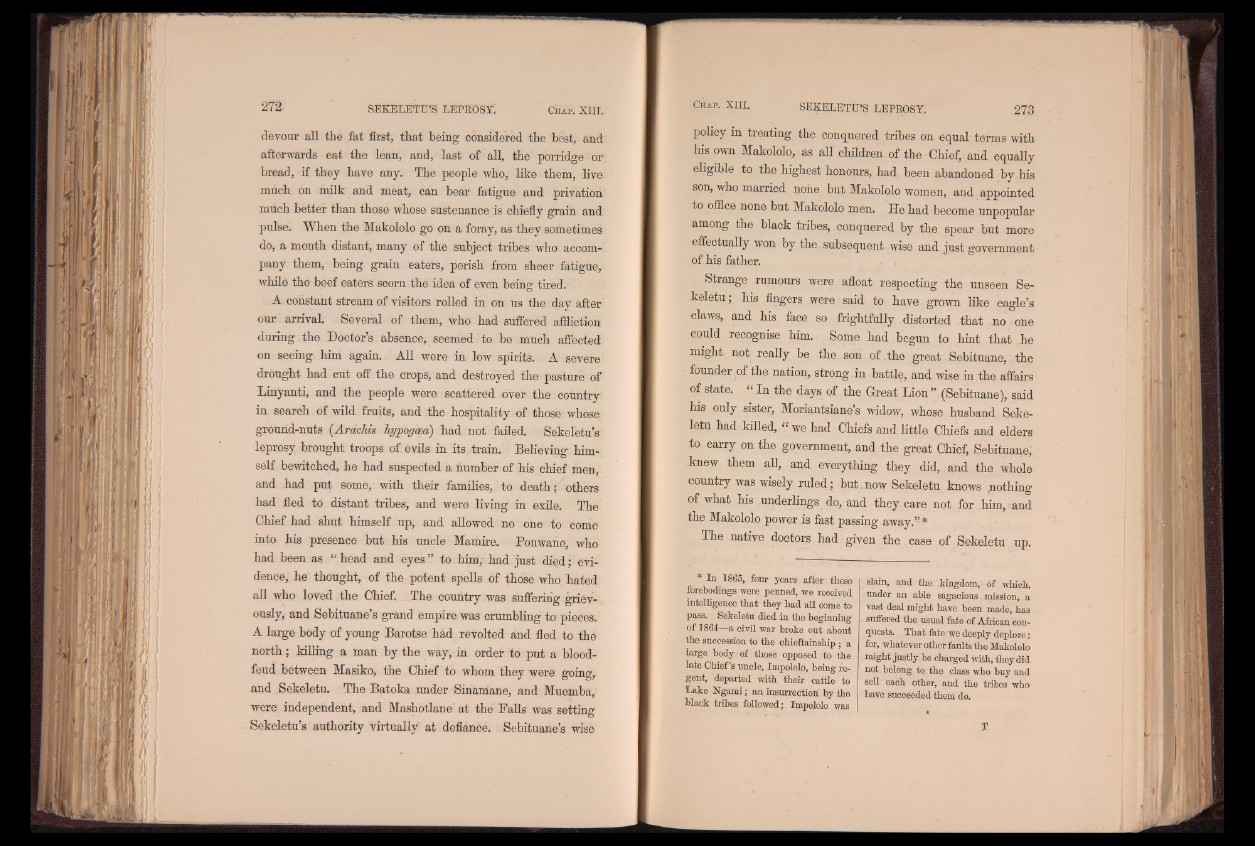
devour all the fat first, that being considered the best, and
afterwards eat the lean, and, last of all, the porridge or
bread, if they have any. The people who, like them, live
much on milk and meat, can bear fatigue and privation
much better than those whose sustenance is chiefly grain and
pulse. When the Makololo go on a foray, as they sometimes
do, a month distant, many of the subject tribes who accompany
them, being grain eaters, perish from sheer fatigue,
while the beef eaters scorn the idea of even being tired.
A constant stream of visitors rolled in on us the day after
our arrival. Several of them, who had suffered affliction
during the Doctor’s absence, seemed to be much affected
on seeing him again. All were in low spirits. A severe
drought had cut off the crops, and destroyed the pasture of
Linyanti, and the people were scattered over the country
in search of wild fruits, and the hospitality of those whose
ground-nuts (Arachis hypogcea) had not failed. Sekeletu’s
leprosy brought troops of evils in its train. Believing himself
bewitched, he had suspected a number of his chief men,
and had put some, with their families, to death; others
had fled to distant tribes, and were living in exile. The
Chief had shut himself up, and allowed no one to come
into his presence but his uncle Mamire. Ponwane, who
had been as “ head and eyes ” to him, had just died; evidence,
he thought, of the potent spells of those who hated
all who loved the Chief. The country was suffering grievously,
and Sebituane’s grand empire was crumbling to pieces.
A large body of young Barotse had revolted and fled to the
north; killing a man by the way, in order to put a blood-
feud between Masiko, the Chief to whom they were going,
and Sekeletu. The Batoka under Sinamane, and Muemba,
were independent, and Mashotlane at the Falls was setting
Sekeletu’s authority virtually at defiance. Sebituane’s wise
policy in treating the conquered tribes on equal terms with
his own Makololo, as all children of the Chief, and equally
eligible to the highest honours, had been abandoned by his
son, who married none but Makololo women, and appointed
to office none but Makololo men. He had become unpopular
among the black tribes, conquered by the spear but more
effectually won by the. subsequent wise and just government
of his father.
Strange rumours were afloat respecting the unseen Sekeletu;
his fingers were said to have grown like eagle’s
claws, and his face so frightfully distorted that no one
could recognise him. Some had begun to hint that he
might not really be the son of the great Sebituane, the
founder of the nation, strong in battle, and wise in the affairs
of state. “ In the days of the Great Lion ” (Sebituane), said
his only sister, Moriantsiane’s widow, whose husband Sekeletu
had killed, “ we had Chiefs and little Chiefs and elders
to carry on the government, and the great Chief, Sebituane;
knew them, all, and everything they did, and the whole
country was wisely ruled; but. now Sekeletu knows nothing
of what his underlings do, and they care not for him, and
the Makololo power is fast passing away.” *
The native doctors had given the case of Sekeletu up.
* In 1865, four years after these
forebodings were penned, we received
intelligence that they had all come to
pass. Sekeletu died in the beginning
of 1864—a civil war broke out about
the succession to the chieftainship ; a
• large body of those opposed to the
late Chief’s uncle, Impololo, being regent,
departed with their cattle to
Lake Ngami; an insurrection by the
black tribes followed; Impololo was
slain, and the kingdom, of which,
•under an able sagacious mission, a
vast deal might have been made, has
. suffered the usual fate of African conquests.
That fate-we deeply deplore;
for, whatever other faults the Makololo
might justly be charged with, they did
not belong to, the class who buy and
sell each other, and the tribes who
have succeeded them do.